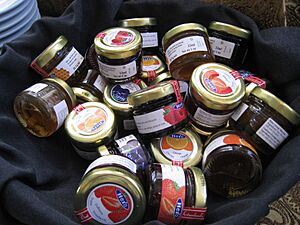Hero Group facts for kids
| Private | |
| Industry | Food industry manufacture of prepared meals and dishes other processing and preserving of fruit and vegetables |
| Founded | 1886 |
| Founder | Gustav Henckell Gustav Zeiler |
| Headquarters | Lenzburg (Aargau), Switzerland |
|
Area served
|
Worldwide |
|
Key people
|
|
| Products | Baby & Toddler Food, Baby & Toddler Milk, Jams, Healthy Snacks |
| Revenue | |
|
Number of employees
|
4,300 (2015) |
The Hero Group is a company from Switzerland that makes and sells food. It is a private company, meaning it is not traded on the stock market. Hero Group focuses on making food for babies and toddlers. They also create healthy snacks and natural fruit spreads like jams. Some of their well-known brands include Corny Snack Bars and Semper Baby food.
What Hero Group Does
Hero Group makes many different food products. They focus on a few main types of food. These include baby food, toddler milk, and healthy snacks. They also make delicious jams and fruit spreads.
The company sells its products all over the world. You can find Hero Group products mainly in Europe, North America, the Middle East, Africa, Turkey, and Central Asia.
Hero Group's Story
The Hero Group started a long time ago in 1886. It was founded in a town called Lenzburg in Switzerland. Two German immigrants, Gustav Henckell and Gustav Zeiler, started the company.
In 1888, an investor named Carl Roth joined the business. After Gustav Zeiler passed away in 1890, the company got its name. They combined the first two letters of Henckell and Roth's names. This created the name 'Hero Conserven Lenzbourg'.
In 1995, a person named Arend Oetker bought most of the company. By 2003, his family owned the entire Hero Group. In 2024, Hero Group bought the 'Deliciously Ella' brand. This brand was started by Ella Mills.
 | Georgia Louise Harris Brown |
 | Julian Abele |
 | Norma Merrick Sklarek |
 | William Sidney Pittman |


